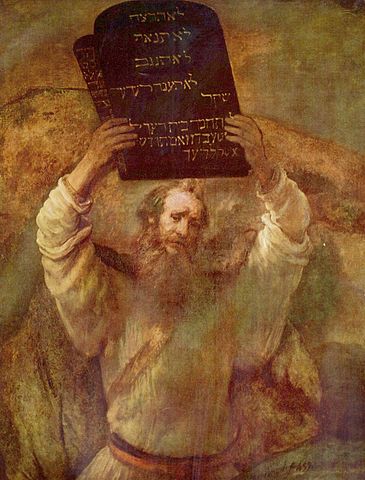I once heard a sermon in which the speaker made the statement:
"The Ten Commandments are irrelevant."
How did he come to this conclusion?
 He was preaching from 2 Cor. 3, the chapter where Paul talks about how the New Covenant has a "greater glory" than the Mosaic Covenant (2 Cor. 3:10). Paul also says that the Mosaic Covenant is "being abolished" (Greek: καταργούμενον, 2 Cor. 3:11). Unfortunately, the sermon speaker had read Paul's words from verse 7 -- where he talks about "the ministration of death engraved on stones" -- and made the following "logical" connection:
He was preaching from 2 Cor. 3, the chapter where Paul talks about how the New Covenant has a "greater glory" than the Mosaic Covenant (2 Cor. 3:10). Paul also says that the Mosaic Covenant is "being abolished" (Greek: καταργούμενον, 2 Cor. 3:11). Unfortunately, the sermon speaker had read Paul's words from verse 7 -- where he talks about "the ministration of death engraved on stones" -- and made the following "logical" connection:
-
The "ministration of death engraved on stones" is the Ten Commandments. (A = B)
-
The "ministration of death engraved on stones" is the Mosaic Covenant. (A = C)
-
The Mosaic covenant was "being abolished" in Paul's time (presumably because Paul was writing prior to the destruction of the Second temple in A.D. 70), and it is now gone. (C is now abolished)
-
Therefore, the Ten Commandments are irrelevant. (B is now abolished and irrelevant)
The tragedy was that this teacher was claiming that his Christian community didn't understand the "covenants" properly. He was offering his teaching to correct others' misunderstandings of the covenants. Ironically, the plank was in his own eye.
What went wrong?
There are at least three problems with the reasoning above (primarily due to fallacies of equivocation):
1. The "ministration of death engraved on stones" is not identical to the Ten Commandments.
The Ten Commandments are a summary of God's law, given because of His love for mankind. Jesus even alluded to this when he said "The sabbath was made for man, and not man for the sabbath." (Mark 2:27) The Ten Commandments exist independently of any written representation (like tablets, or ink on paper). They also exist independently (and prior to) their inclusion in the Mosaic Covenant, because they are God's expression of His own good character.
2. The "ministration of death engraved on stones" is not identical to the Mosaic Covenant.

The rainbow
is a covenant token
The tablets upon which God inscribed the Ten Commandments were covenant tokens, which acted as a physical, but symbolic, representations of the Mosaic Covenant. We see examples like this elsewhere in Scripture. For example, God gave the rainbow as the covenant token of his promise to Noah: Genesis 9:11-13. He gave circumcision as a token of His covenant with Abraham and his descendants: Gen. 17:11.
The gold ring I wear on my left hand is a covenant token of my marriage, but it is not identical with my marriage covenant. Covenant tokens are useful, in a symbolic sense, but they are not ontologically tied to the covenant. If I lose or destroy my ring, my marriage covenant wouldn't be affected. When Moses broke the first two tablets, that may have meant something in a symbolic sense, but it didn't mean that the Mosaic Covenant was abolished. When God took away the ark of the Covenant which contained the tablets with the Ten Commandments, that may have meant something in a symbolic sense, but it didn't mean that the Ten Commandments were suddenly irrelevant.
3. The fact that the Mosaic covenant has been abolished says nothing about the Ten Commandments.
If you think Paul is saying (either here or elsewhere) that the whole law is abolished, then you have a big interpretive problem on your hands. Jesus said very clearly: "Do not think that I came to abolish the law or the prophets." (Matt. 5:17) Yes, parts of the Mosaic law were provisional. Parts of it were prophetic. Most of it, though, is grounded in the character of God Himself.
The Ten Commandments are a top-level summary of those parts of God's law which are grounded, unchangingly, in God's own character. God's law shows us His character. God's law shows us how to love our neighbor. The New Covenant (with its gift of the Holy Spirit) helps us to follow those parts of God's law which will never change. That is why the author of Hebrews says (quoting Jeremiah 31:33 as being fulfilled):
If you are in the New Covenant, then the law is now written upon your heart and mind, and you have become God's token of the New Covenant.
